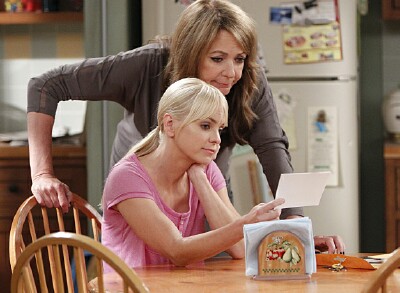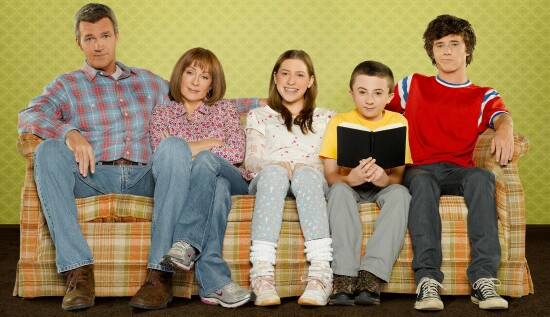Giving Thanks for "The Middle" and "Mom" -- Ed Martin

When talking television, let us give thanks this holiday weekend for two shows that stand out from their genre peers: ABC’s “The Middle” and CBS’ “Mom.” As situation comedies go, these two are smarter and funnier than most and every bit as entertaining as the immensely popular “Modern Family” and “The Big Bang Theory” (also on ABC and CBS, respectively).
The quality that sets “The Middle” and “Mom” apart from most comedies is that they overflow in every episode with uncanny insights into the way tens of millions of American families actually live, a quality generally absent from other series in the family sitcom genre, since the ‘50s a crucial cornerstone of the foundation of broadcast television. It’s as if every comedy producer in Hollywood except those directly involved in the creation of these two shows is afraid to acknowledge the reality of modern family life: It’s all about living without enough money and the ways in which people behave under those circumstances.
Frankie and Mike Heck (the underappreciated Patricia Heaton and Neil Flynn), the loving, cash-poor, and generally very tired working class couple on “The Middle,” have little in common with Bonnie and Christy Plunkett (Allison Janney and Anna Faris), the mother and daughter alcoholics and former substance abusers struggling to either put or keep their lives together on “Mom” – other than the fact that, for very different reasons, they have no money and live paycheck to paycheck, sliding ever-deeper into debt as they go and with no turnaround in sight.
On “The Middle,” now in its sixth season and better than ever, Mike recently freaked when he thought he lost his wallet. (One of his kids had hidden it as part of a prank.) When he got it back and took inventory, he was relieved to find “the credit card that pays for the other credit cards.” If anyone reading this claims to not know of at least one family living that way I would question his or her honesty.

The Hecks, who are working three jobs between them, in part to help their children sustain dreams of higher education, are currently living without their recently lost dining room table and their kitchen sink, neither of which they can afford to replace. (A new table and sink haven’t miraculously appeared in subsequent episodes, as they would on other shows.) Every day brings new financial challenges, but love and a sense of hopeful resignation keep them together.
On “Mom,” the Plunketts are always facing crises more dire than anything the Hecks have had to handle. Unable to pay the rent on their shabby little home, they were evicted at the start of the show’s second season and suddenly found themselves homeless, forced to live at first in a motel room (two doors down from a meth lab) and then with a friend and her houseful of cats. Throughout, Christy’s daughter Violet has been struggling to cope with her decision last season to give her baby girl up for adoption so that she might have a better life than all members of the Plunkett family.
I don’t think we’ve seen a family face so many serious issues since Florida Evans and her children coped with the economic hardships of the ‘70s, life in a Chicago housing project and the death of dad James in the Norman Lear classic “Good Times.”
What I like best about “The Middle” and “Mom” is the very thing that pushes me away from most comedies, where characters we are meant to relate to live in ways that suggest money is no object or even worth thinking about. On those shows, I wonder why the characters don’t rise above their challenges and conflicts simply by making the kinds of changes in their lives that are relatively easy to deal with when finances aren’t an issue.
On “The Middle” and “Mom” the characters are “stuck” in a way most of us are, or perhaps used to be. They can’t afford to move, or to take pay cuts, or lose their health insurance, or buy a new kitchen sink, or take risky chances of any kind. They have to “make do,” an expression most boomers grew up hearing that is, I believe, largely unknown to Generation E. Also, the adult characters in both worry all the time about their kids’ futures, which hold no identifiable promise of less punishing economic hardships.
I can’t help but wonder why more television comedies don’t explore life as most of us know it, rather than the way it is lived in the better parts of Sherman Oaks and Pasadena. “The Middle” and “Mom” certainly do so in very entertaining fashion. Many dramas, I might add, also undercut the urgency of their characters’ conflicts by placing them in comfortable homes beyond the reach of most viewers. Can it be that the producers of such shows don’t trust the appeal of their storytelling enough to put their characters in environments that are not somehow extraordinary?
I can’t say that I live like the Hecks or the Plunketts, or that I would want to, but I can still relate to much of the “real life” content I see on “The Middle” and “Mom.” For that, I am thankful.
Ed Martin is the Editor of MediaBizBloggers and the television and video critic for the Myers Business Network. Follow him on Twitter at @PlanetEd.
Business Network. Follow him on Twitter at @PlanetEd.
Check us out on Facebook at MediaBizBloggers.com
Follow our Twitter updates at @MediaBizBlogger
The opinions and points of view expressed in this commentary are exclusively the views of the author and do not necessarily represent the views of MediaBizBloggers.com management or associated bloggers. MediaBizBloggers is an open thought leadership platform and readers may share their comments and opinions in response to all commentaries.


